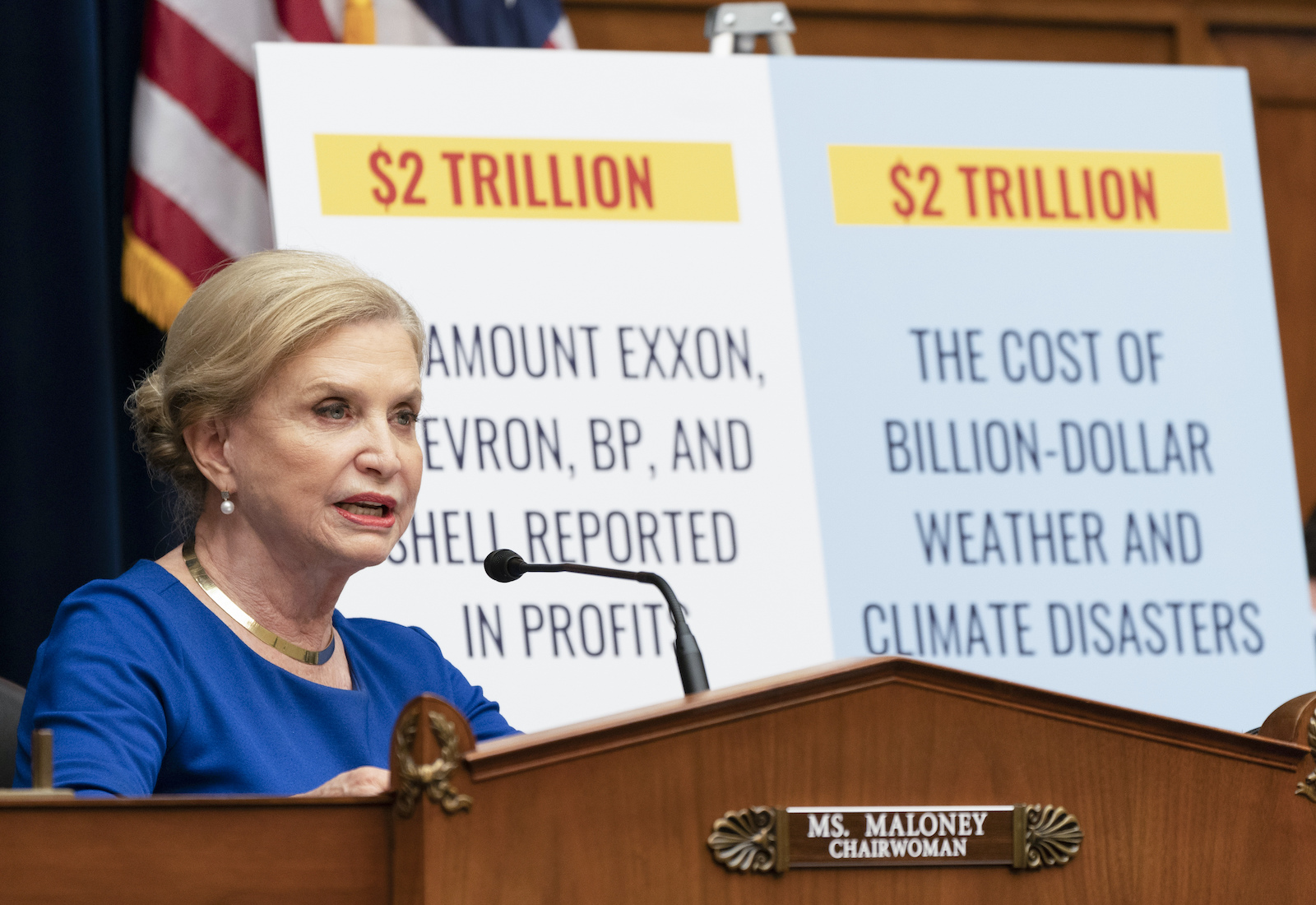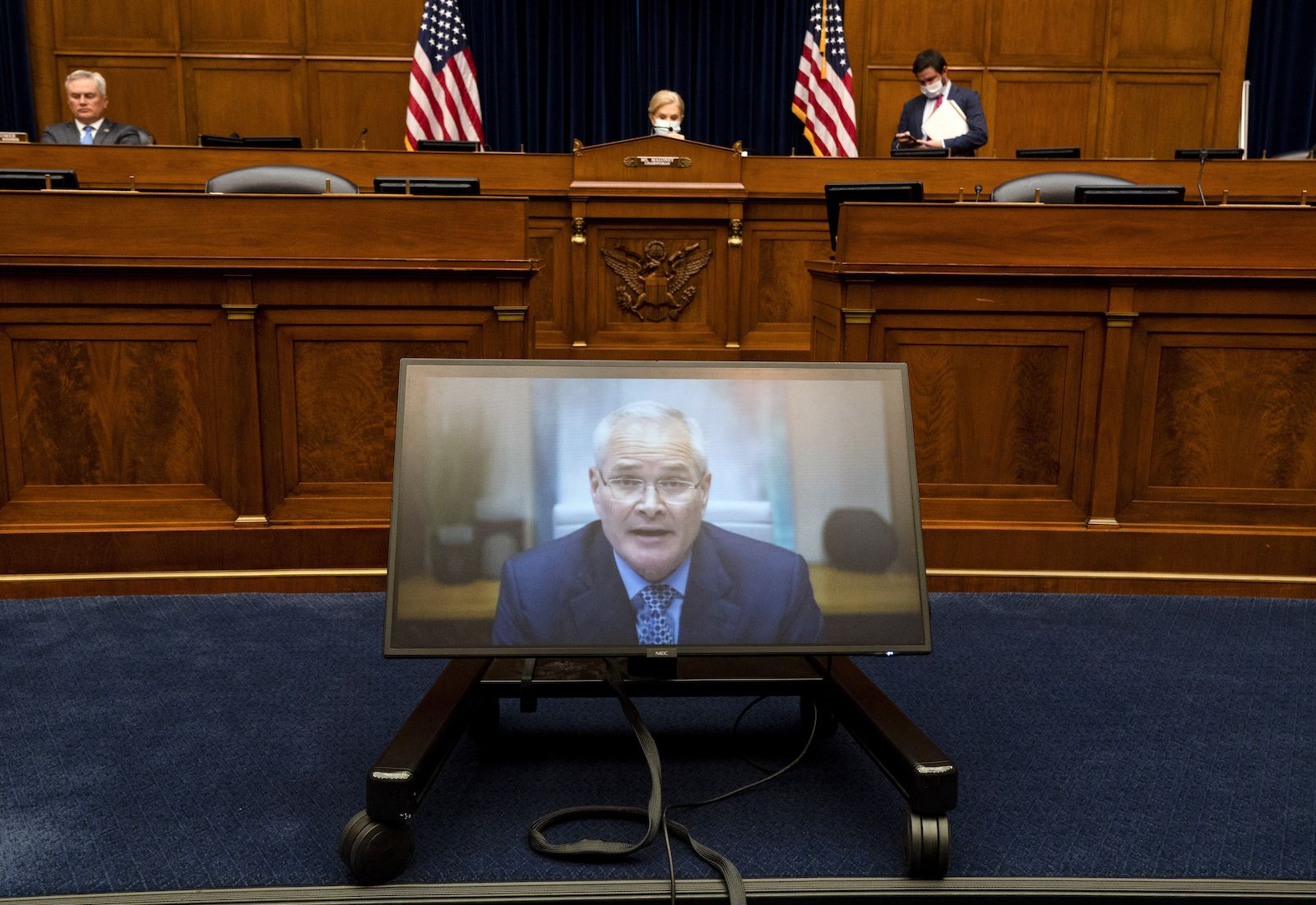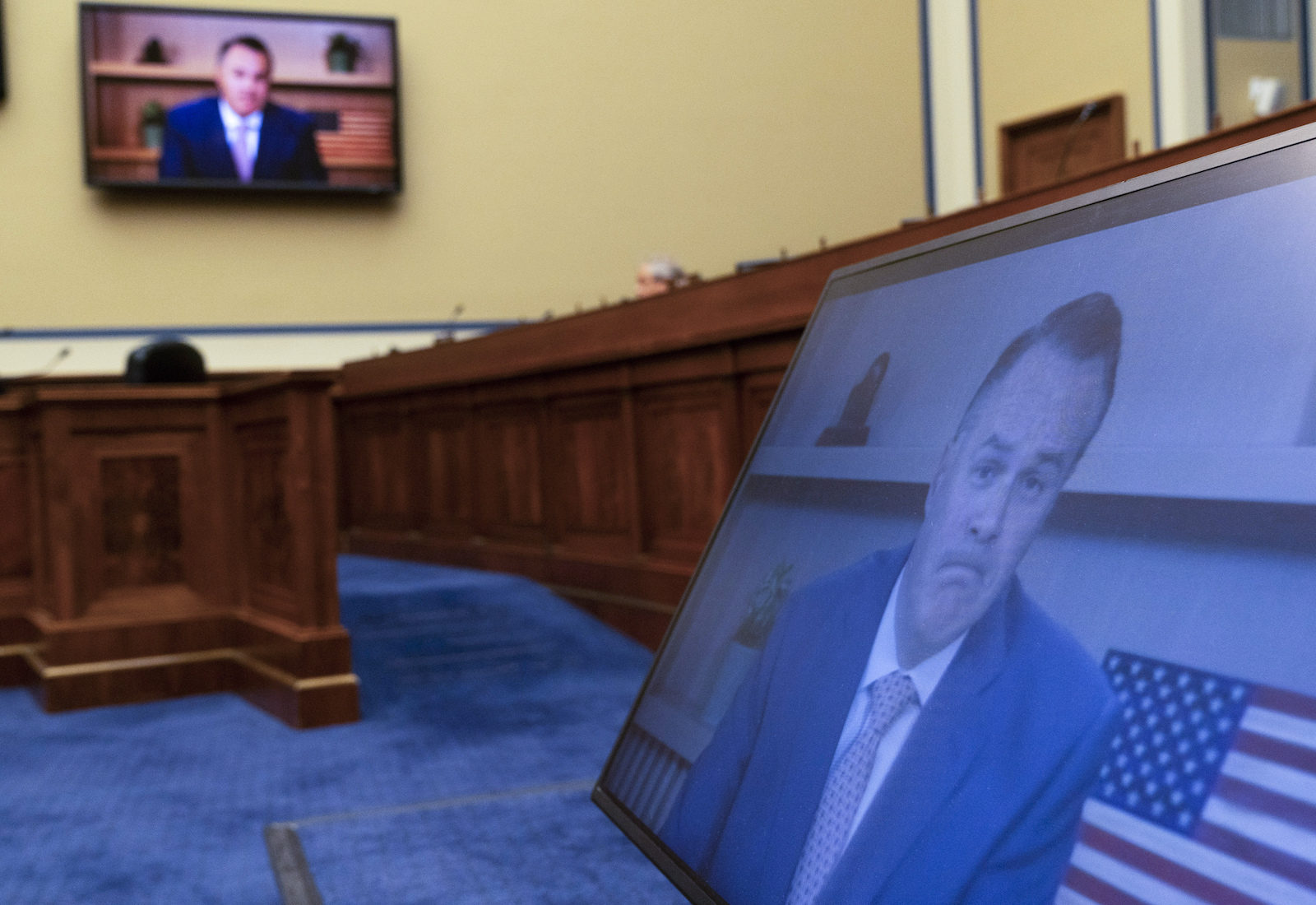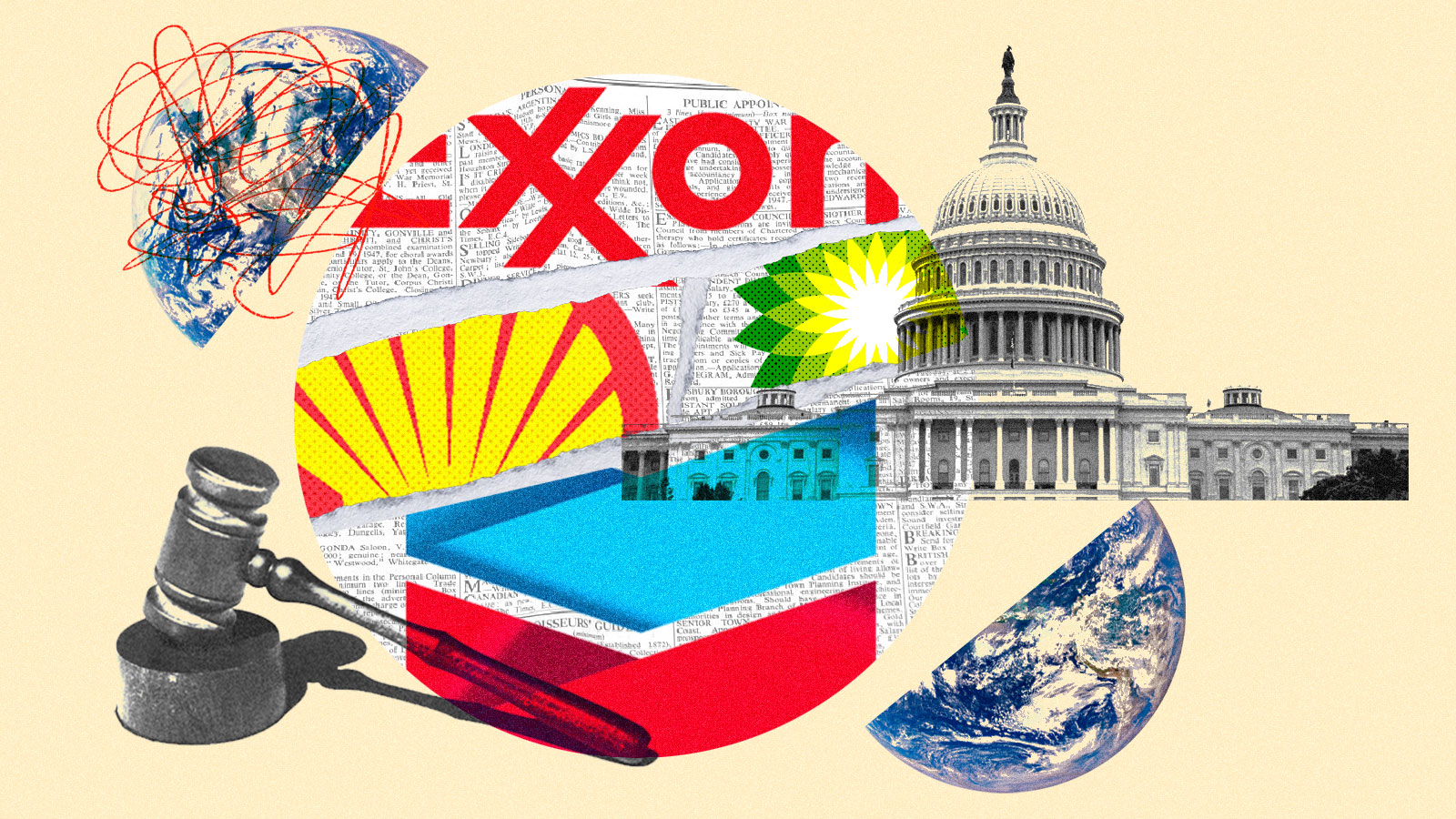Four of the fossil fuel industry’s head honchos appeared before the House Oversight Committee on Thursday to testify about their companies’ history of climate denial. The CEOs of Exxon, BP America, and Chevron and the president of Shell’s U.S. subsidiary were present, along with the presidents of two top lobbying groups: the American Petroleum Institute and the U.S. Chamber of Commerce. It was a landmark moment — the first time that the executives addressed Congress about their “long-running, industry-wide campaign to spread disinformation about the role of fossil fuels in causing global warming,” as an announcement from Democratic Representatives Carolyn Maloney and Ro Khanna put it.
The executives’ testimony was predictably opaque. By the end of the hearing, they had not, as many activists had hoped, admitted culpability for deceiving the public about the risks of climate change, or for obstructing climate action through third-party lobbying groups.
“As science has evolved and developed, our understanding of the science has evolved and developed,” said Darren Woods, ExxonMobil’s CEO. It was a similar story throughout the day, as pointed question after pointed question from Democrats received cryptic non-answers. Climate change “is one of the biggest challenges of our time,” Chevron’s Mike Wirth said. “We believe the future of energy is lower-carbon.”
Geoffrey Supran, a research associate in the history of science at Harvard University who has studied the industry’s disinformation campaigns, said the executives’ behavior was predictable. “It wasn’t a surprise that they dug in their heels and didn’t break down with a mea culpa,” he told Grist. “They were well-trained and well-rehearsed in these questions.”
Meanwhile, Republicans on the committee acted as a cheering section for the executives. “I think it’s shameful how the other side wants to demonize our oil and gas industry,” Representative Bob Gibbs of Ohio, a Republican, said. Byron Donalds, a Republican representative from Florida, addressed the fossil fuel executives directly. “I’m sorry for you, and I’m sorry for the people in our country who have to witness shenanigans like this,” he said.

Indeed, much of the hearing saw the four company heads stuck in a push and pull between Republicans and Democrats on the committee, with Democrats trying to eke new climate-related pledges out of the witnesses and Republicans trying to shield said witnesses from Democrats.
“Some of us have to actually live the future that you are setting on fire for us,” Representative Alexandria Ocasio-Cortez, a Democrat from New York, reminded the witnesses toward the end of the hearing, after her colleagues had tried and failed to get the executives to support a pause on oil and gas leasing on federal lands, reveal their anti-climate lobbying activity, and admit to using third-party groups to lobby against climate change initiatives in multiple states.
The hearing had been widely anticipated by environmental advocates, who have spent years calling for a federal investigation into the oil and gas industry — first and foremost for having deceived the public about the reality of climate change. Documents uncovered in 2015 by InsideClimate News and the Los Angeles Times revealed that ExxonMobil knew as early as 1977 that fossil fuels would have dangerous consequences for the planet’s climate. In fact, the documents showed, Exxon’s in-house climate scientists were so good that in 1982, they correctly predicted that the concentration of CO2 in the atmosphere would rise to roughly 415 parts per million by the year 2019. They warned that the impacts could be “catastrophic.”
InsideClimateNews’ reporting was a finalist for the 2016 Pulitzer Prize and gave rise to the hashtag #ExxonKnew. But more recent reporting has shown that other oil companies knew too, including Shell, BP, and the corporate entities that later became Chevron — all of the companies represented at the House Oversight Committee hearing. Rather than using their extensive climate knowledge to warn the world of an urgent need to decarbonize, the companies launched a multifaceted disinformation campaign meant to cast doubt on the reality of global warming. They ran advertisements to stress “uncertainty” in climate science. In some cases, they highlighted the potential benefits of climate change.

“Their argument that their positions have always been in line with science is demonstrably false,” Supran said. But rather than confirm what is evident in publicly available documents, the executives “punted.”
None of the fossil fuel company executives present on Thursday denied the science of climate change; their companies dropped outright climate denial years ago. In fact, all of them said that they support some sort of climate policy, and the two firms headquartered in Europe — Shell and BP — have announced plans to achieve net-zero greenhouse gas emissions by 2050. (Chevron said this month that it has an “aspiration” of hitting net-zero by 2050, but only for its operational emissions, not the emissions from the oil it sells.)
But the Oversight Committee’s Democratic members were skeptical of their about-face on climate action. “They are obviously lying,” Maloney said at one point. “Our witnesses today would like you to think that their actions” to obstruct climate action “are ancient history, but they are not.” She cited a Greenpeace U.K. sting operation conducted earlier this year, in which an undercover reporter recorded a top ExxonMobil lobbyist saying that the company’s support for a carbon tax was largely performative. Exxon backed it as a “talking point,” the lobbyist said, but didn’t believe it would ever be enacted.
The lobbyist also spoke candidly about the company’s influence strategy, saying that ExxonMobil funded “shadow groups” to spread doubt about climate science.
Maloney played the clip during the hearing and turned to the oil executives. “I want each of you to affirm that your organization will not spend any money, either directly or indirectly, to oppose efforts to reduce emissions and address climate change,” she told them. No one took the pledge, either staying silent or listing off their companies’ talking points. BP’s executive hedged by inventing a different, unrelated pledge to “advocate for low-carbon policies.”

ExxonMobil and other oil and gas majors have recently come under fire for funding lobbying groups — including the Chamber of Commerce and the American Petroleum Institute — that oppose the Democrats’ multitrillion-dollar reconciliation package. Even though it’s been watered down from its original proposal, the $1.85 trillion framework as it currently stands would still funnel $555 billion toward fighting the climate crisis and would represent the most significant piece of climate legislation ever passed in the U.S.
The Chamber of Commerce has vociferously opposed the bill as an “everything but the kitchen sink collection of bad policies,” and vowed to do “everything we can” to defeat it. The American Petroleum Institute similarly said it was “using every tool at our disposal” to work against it, including by spending at least $423,000 on Facebook ads that have been viewed more than 20 million times.
By the time the hearing wrapped up, it was obvious that the historic day had not yielded any groundbreaking revelations. Democrats on the committee hit the witnesses with every tool in their arsenal — visual aids in the form of bags of rice and M&Ms, sheafs of evidence that oil companies used front groups to kill climate action up and down ballots across the country, even some vaguely therapeutic and possibly counterproductive yelling.
But House Democrats have stressed that the hearing was only the beginning of a longer-term strategy to hold the fossil fuel executives accountable for past and present climate obstruction. An obvious next step is to force the companies to comply with document requests that were made weeks ago by Maloney and Khanna. Internal documents could help shed new light on the companies’ awareness of climate science and bolster ongoing litigation against them.
In concluding the meeting, Maloney said she intended to subpoena the fossil fuel companies. “We are at ‘code red’ for climate, and I am committed to doing everything I can to help rescue this planet and save it for our children,” she said. “We need to get to the bottom of the oil industry’s disinformation campaign, and with these subpoenas, we will.”




